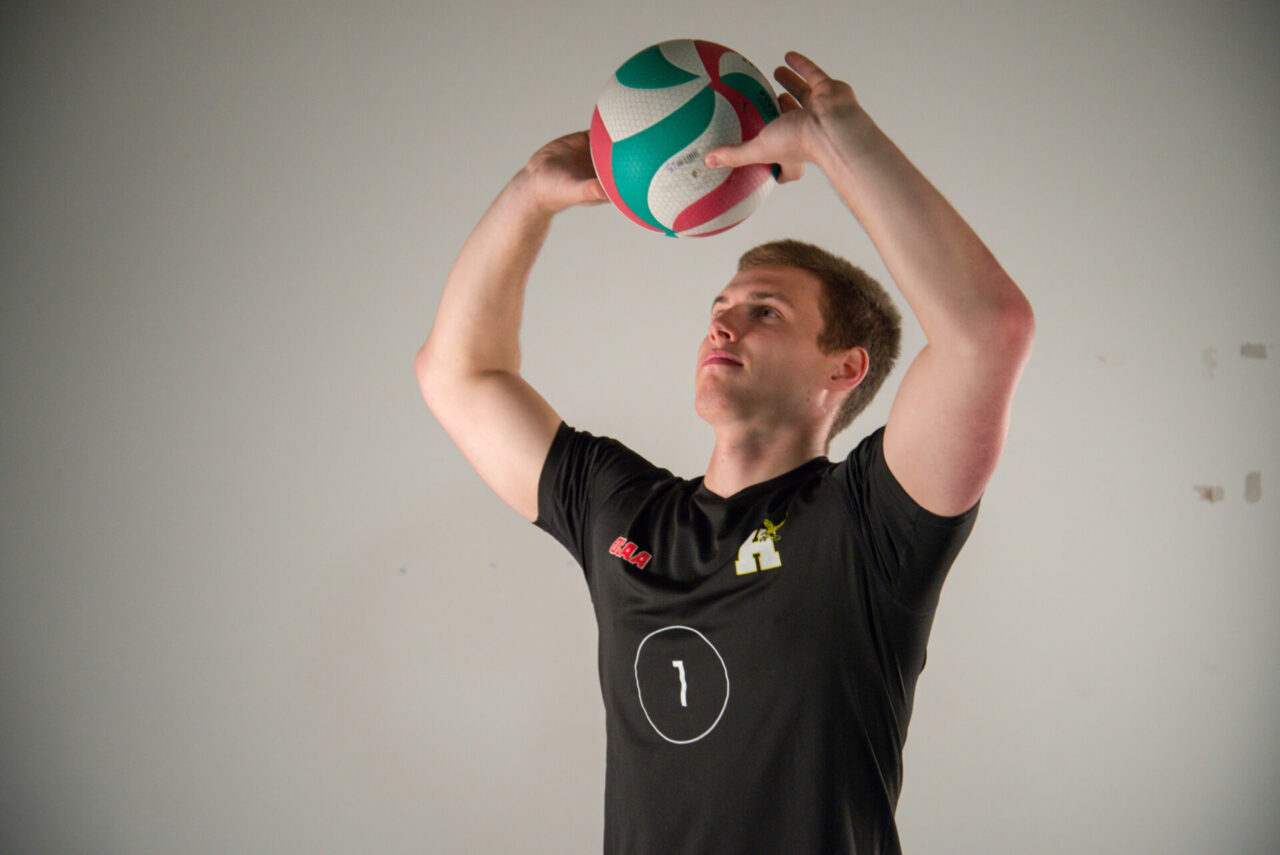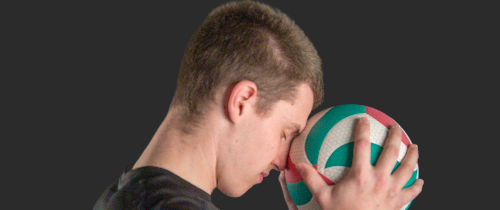By Drew Chambers
In November 2022, Christopher Bowen, a four-year Libero on the Men’s volleyball team for Humber College, was lacing up for a routine practice at the gymnasium. It was just two weeks before the CCAA Men’s Volleyball National Championships. Going up for a hit, the 6-foot Georgetown native jumped to hit a ball setup by his teammate, and landed awkwardly on his foot.
The three-time OCAA champion characterized the fall as a bizarre disconnection between mind and limb that was both painful and upsetting. The once familiar sensation of his left leg, now absent, left him reeling. Then, Dr. Hemen Shukla, a Varsity Physician at Humber, gave him the news he feared the most – he had completely torn his anterior cruciate ligament (ACL), a ligament in the middle of his knee.
After experiencing his first-ever injury in his athletic career Bowen was anxious about his ability to recover and regain strength.
“I wasn’t quite aware if I was able to get back on the court or back to even running again. This was quite a traumatic experience for me physically and mentally,” he says.
Bowen spent the next 12 months not only trying to recover physically but also having to deal with the mental journey caused by this injury. The 22-year-old had to rest while watching teammates play. He constantly second guessed himself about whether or not he’d even make it back to the court. He suffered early setbacks, like significant swelling in his left leg three months post-operation, and the mental game became even more challenging. It all led to an anxious mind, something Bowen had to deal with daily. His mind was filled with negative thoughts and what-ifs about an uncertain return to the sport he’s been playing since he was 10 years old.
Bowen had never encountered an injury like this before. And he didn’t know how to deal with it. But what Bowen didn’t know was that his recovery journey and the mental health toll it took, looks a lot like most OCAA athletes’ journeys when they suffer a traumatic injury.
One challenge that most athletes face is viewing the challenges they experience as a threat, as opposed to a challenge.
Judy Gross, Mental Performance Consultant
According to a study, “The Role of Psychological Resilience in Athletic Injury Recovery and Performance”, by Kaza Mojtahe and Kyle Burrichter, published in the Journal of Sports Psychology, an injured athlete’s mental landscape is a realm where resilience is pushed to its limits. The authors analyzed the significant impact that psychological resilience has on the healing process and performance after an accident and sheds insight into an athlete’s mindset, especially for those who have suffered the crippling blow of an injury. The capability to manage lapses, maintain a positive mindset, and rebound from adversity are critical factors determining an athlete’s recovery, the study reported.
Dr. Judy Goss, PhD, a Mental Performance Consultant, who has amassed 25 years of experience in Toronto, specializes in mental skills training, program management, leadership, and research development for diverse sports. She said that this is one psychological obstacle that stands in the way of a full recovery.
“One challenge that most athletes face is viewing the challenges they experience as a threat, as opposed to a challenge,” Goss said. “Having a perspective that approaches bumps along the way as something they can learn from and better prepare them for the future is critical. Certainly, having someone to support you along the way and encourage this perspective is important.”
Nadeka Boothe, a former varsity athlete, now an Assistant Coach for Sheridan College’s women’s soccer team, emphasized the importance of having a good support network.
“Team sport emphasizes the idea of community,” Boothe said. “Having a group of people that are a support system is a huge asset and one you should lean on when needed.”
Coaches like Boothe play a crucial role in fostering the mental resilience of student-athletes. They provide daily guidance to athletes, serving as mentors and fostering a positive mindset while also providing physical training.
“One of the most fulfilling aspects of team sports is that you have a band of peers that in many ways are experiencing the same challenges and adversity that you are,” Boothe said. “You can look to them for an ear, advice, and support as you navigate the inevitable challenges that life throws your way.”
Boothe spoke of how whether it’s a missed shot, a fumble, or a defeat, imperfections are woven into the fabric of competition, just as they are into the tapestry of our daily experiences.
“Sports mimics real life. You’ll never play a perfect game. Similarly, life will always have its challenges,” Boothe said. “Much of our survival hinges on our capacity to adapt when confronted with challenges, and to find resilience in moments of adversity.

The athlete’s mind could be described as self-compassion according to a 2022 study named “Resilience and Enhancement in Sport, Exercise, Training (RESET): A brief self- compassion intervention with NCAA student-athletes” by doctors from the University of Texas and University of Alberta.
The study claims that taking a supportive rather than judgmental attitude to personal imperfection, whether it be something like an injury, leads to greater well-being and more ability to cope with adversity in sports. It tells us that due to the prevailing expectation of toughness in sports culture, many athletes, including student-athletes and coaches, believe this judgmental attitude or harsh criticism is essential for improvement.
‘Steven Kopas, Head Athletic Therapist at Seneca College, said there are a range of distinctive mental health challenges athletes might encounter throughout their college career.
“Coaches, staff, and teammates can play a crucial role in reducing the stigma around mental health. Openly discussing and sharing experiences can help eliminate the misconception that someone is flawed in managing mental wellness challenges,” he said. “By acknowledging that, it is normal and natural to have times of difficulty, then we can support and assist each other.”
Bowen returned to the court late October this year. While still facing some challenges regarding the fluidity of his movements, the fifth-year Humber student who is studying his postgraduate certificate in exercise science and lifestyle management said he couldn’t stop smiling. He was finally reunited with the sport he loves after being away from it for so long. He said the support system he had – two loving parents, a head trainer and clinic manager – helped him stay positive, so he was able to navigate a rigorous nine-month recovery program.
Bowen said volleyball is not a one-person sport.
“There’s six or seven people on the court, and you just have to work together as a team. I like to lean on my teammates in a sense that if I’m uplifting and I can bring the energy, then it helps me know that I have people around me to support,” he says.
“Persistence is key. Feeling like giving up is a thought that may come through. But if you persist every day, no matter how small of a job you do in that single day or week, small things can lead to bigger outcomes.”

